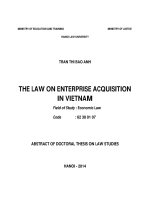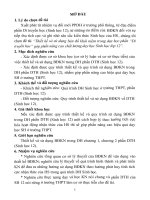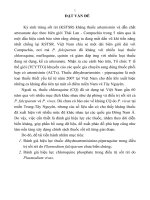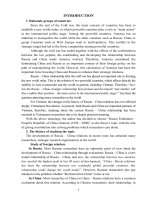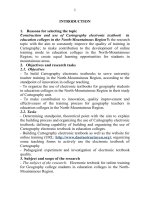tóm tắt luận án tiêng anh giáo dục hướng nghiệp cho học sinh trong dạy học môn công nghệ ở trường trung học phổ thông
Bạn đang xem bản rút gọn của tài liệu. Xem và tải ngay bản đầy đủ của tài liệu tại đây (532.59 KB, 27 trang )
1
MINISTRY OF EDUCATION & TRAINING
THAI NGUYEN UNIVERSITY
TRINH VAN CUONG
CAREER-ORIENTED EDUCATION FOR
STUDENTS IN TEACHING THE SUBJECT
TECHNOLOGY IN HIGH SCHOOL
Major: THEORY AND EDUCATIONAL HISTORY
Code: 62. 14. 01. 02
SUMMARY OF DOCTORAL DISSERTATION OF
EDUCATIONAL SCIENCE
THAI NGUYEN - 2013
2
Dissertation was completed at:
COLLEGE OF EDUCATION – THAI NGUYEN UNIVERSITY
Scientific supervisors:
1. Assoc.Prof. Dr. Ha The Truyen
2. Prof. Dr. of Science Nguyen Van Ho
Opponent 1:.......................................................................
Opponent 2:.......................................................................
Opponent 3:.......................................................................
The dissertation will be defended before the Jury at:
COLLEGE OF EDUCATION - THAI NGUYEN UNIVERSITY
At ......hour ....... date......month....... 2013
The dissertation can be studied in:
Learning resource center – Thai Nguyen University
Library of Hanoi National University of Education
3
LIST OF PUBLISHED WORKS REALATING THE
DISSERTATION BY AUTHOR
Trinh Van Cuong (2009), “Promoting the role of Vocational
Comprehensive Technical Center", Education magazine, No. 205,
issue 1, January 2009, page 9 -10.
2.
Trinh Van (Anh) Cuong (2012), “Research of career-oriented
education in teaching Technology in high school”, Education
management magazine, No. 41, October 2012, page 33 -35.
3.
Trinh Van Cuong (2012), “Career-oriented education in teaching
Technology in high school and implementation measures”, Education
magazine, No. 297, issue 1, November 2012, page 20-22.
4.
Trinh Van (Anh) Cuong (2012), “Integrating career-oriented
education in teaching Technology in high school”, Education
management magazine, issue 43, December 2012, page 41-45.
5.
Trinh Van (Anh) Cuong (2013), “Practical basis of career-oriented
education in teaching Technology in high school", Education
management magazine , No. 45, February 2013, page 55-58.
6.
Trinh Van Cuong (2013), “Some forms of career-oriented education for
high school students", Education magazine, No. 306 , issue 2, March
2013, page 11-12.
7.
Trinh Van Cuong (2013), “Improving awareness of career-oriented
education in teaching technology in high school", Educational & Social
Magazine, No. 24, March 2013, page 33-35.
8.
Trinh Van Cuong (2013), “The potential of career-oriented education
in teaching technology in high school", Education management
magazine, No. 44 , April 2013, page 51-54.
9.
Trinh Van Cuong (2013), “Application of information technology in
career-oriented education for high school students through technology
subject", Educational equipment magazine, No. 93, May 2013, page
28-30.
10. Trinh Van Cuong (2013), “Real situation of career-oriented education
in teaching Technology subject in high school", Education magazine,
No. 310, issue 2, May 2013, page 22-23.
11. Trinh Van Cuong (2013), “The process of teaching Technology
subject by integrating career-oriented education for high school
students", Educational & Social magazine, No. 27, June 2013, page
24-27.
12. Trinh Van Cuong (2013), “The process of career-oriented education
for students through technology subject in high school", Education
Management magazine, No. 51, August 2013, page 39-43.
1.
1
INTRODUCTION
1. The reason to choose the research title
According to the figures of General Statistics Office, Vietnam 's
population now reaches nearly 90 million people, ranking 13th in the
world and the 2nd in Southeast Asia. In term of labor force, Vietnam
has 51.4 million people aged 15 and older in the labor force,
accounting for 58.5 % of its total population. Among 51.4 million
labors, there are nearly 7.8 million trained labors, accounting for 15.4
% of the population. In urban area, trained workers reached 30.9 % ,
while in rural areas this figure is only 9 % .
Career-oriented education is the education which orients career
for students, helping them know of human resource demands of
society, characteristics of specialized professions and thereby they
make decision to choose a job which is suitable for their competence,
forte and excitement. Having an appropriate job brings a happy mean
of support for each individual and it can help form a high qualified
human resource for society to meet the requirements of economic and
cultural development.
Once students oriented a career which is appropriate with their
own interest and capabilities, they will have a great motivation to
study in order to pass the entrance exam to vocational schools or
universities which they have been chosen and when they study in
those schools, they will make efforts to study well, to have a
profession in order to ensure a long happy life in the future.
Content of Technology courses in high school is related to
various careers in the fields of agriculture, forestry, fishery, industry,
business as well as economic life of the family. Career-oriented
education for students in teaching technology courses will make
interest in learning for the students, allowing them to increase
understanding of careers in society and a comprehensive and active
vision for career orientation, and also to save time and money for
career-oriented work at school, avoid overlapping and duplication
between contents in career-oriented education.
However, in current situation, career-oriented education in high
school is not be cared properly. By the reasons mentioned above, we
choose the issue "Career-oriented education for students in teaching
technology in high school" to make a contribution to high school
implement career-oriented education task practically and effectively.
2
2. Research objective of the dissertation
On the basis of theoretical research and assessment of the real
situation of career-oriented education for students in high school in
the northeastern region of Vietnam, the dissertation aims to propose
measures of career-oriented education for students in teaching
technology, contributing to implement well goals of career-oriented
education in high schools in this region.
3. Object and subject of the research
3.1. Object of the research
Career-oriented education for high school students in teaching
Technology.
3.2. Subject of the research
Career-oriented education measures for students in teaching
technology in high schools in northeastern region of Vietnam.
4. Scientific hypodissertation
The selection of career for the majority of ethnic minority high
school student in northeastern region of Vietnam is mainly based on
feeling, on majority, because school has not implemented well the
career-oriented education for students. If the school uses appropriate
measures in accordance with psychological characteristics of students
in mountainous area, the local practical conditions to teach
Technology in integration of career-oriented education under
innovation method, the effectiveness of career-oriented education
will be improved.
5. Research tasks
- Researching theoretical basis of career-oriented education for
students in teaching technology in high school.
- Investigating and evaluating the real situation of careeroriented education for students in teaching technology in high
schools in the northeastern region of Vietnam.
- Proposing measures for career-oriented education for students
in teaching technology in high schools in the northeastern region of
Vietnam.
- Experimenting education.
6. Research limit
- The title researches career-oriented education for students in
teaching Technology in 10th, 11th, 12th grade in high school.
- Investigating 16 high schools representing 4 urban, rural,
mountainous and island areas of 10 provinces in northeastern region
3
of Vietnam, in 3 school years from school year 2008-2009 to school
year 2010-2011.
- Organizing a 2-round pedagogical experiment in 4 high
schools in the Northeast region of Vietnam, in school year 2010-2011
and 2011-2012.
7. Protected arguments
- Career-oriented education for high school students of ethnic
minority areas in Northeast mountainous region is a human activity,
creating happiness for each individual and students’ family as well as
meeting the demand on human resources of the local and the country.
- Career-oriented education for high school students in
teaching Technology is a way having many potentials, advantages
and being consistent with psychology of minority students and
educational practice in Northeast region of Vietnam.
8. New findings of the dissertation
- Enriching the theory of career-oriented education for
minority students in teaching technology in high school.
- Assessing properly the real situation of career-oriented
education for students currently in high school in the Northeast
region of Vietnam.
- Proposing measures to integrate career-oriented education for
high school students in the northeast region of Vietnam in teaching
technology, helping to train human resources for local and the country.
9. Research methodologies
9.1. Methods to research theory
9.2. Methods to research practice
9.3. Supportive methods
10. Structure of the dissertation
Besides introduction, conclusion and recommendation, the
dissertation content includes 4 chapters.
Chapter 1
THEORETICAL BACKGROUND OF CAREER-ORIENTED
EDUCATION FOR STUDENTS IN TEACHING
TECHNOLOGY IN HIGH SCHOOLS
1.1. Overview of research issues
1.1.1. The researches in the world
In the mid-nineteenth century in France, the industrialization
process developed rapidly, it has been found that the occupational
4
system has become more diverse and complicated; the production
specialization has exceeded in comparison with the stages of
agricultural and industrial production, and thus the book "Careeroriented guidance for career choices" appeared [44, page 7].
- In 1883, the United States, an psychologist Ph Ganton. gave
birth to research works on occupational competence, proposed to use the
test method (Test) with the aim of helping students choose a career.
- At the beginning of the twentieth century in the United States,
Britain, France, Sweden the centers of vocational services appeared.
Especially, in 1908, Pason F., the lecturer at the University of Garvared
(USA) was the first person to use the term " Career-oriented guidance "
founded the Occupational Council in Boston to help workers choose the
appropriate jobs [63].
- In 1897, Russia, the book of Career-oriented guidanceappeared,
stating the meaning of the job selection before applying to university.
- In the years 1960 – 1970, the Federal Republic of Germany
(West Germany), there were the research works of "the organization
method for high school students to practice at plants, factories,
service business establishments"[64].
- At this time in the German Democratic Republic (East
Germany), there were the education science research works of the
vocational training organization for students.
- Allan Walker, an Australian with the work: "Some issues in
Australian education management" found that: "The school is not
only the place to teach the theory but also the one to form labor skills
for students " [109, p. 53].
- The Japanese Author Magumi Nishino required "to foster
basic knowledge and skills of the necessary fields in society, have an
attitude of respect for employees and the ability to choose future
careers in accordance with each individual " [74, p. 49].
- In 1996, Jacques Delos, the President of International
Committee on Science and Education (UNESCO) confirmed that the
twenty-first century education is: "Learning to know, learning to do,
learning to live together and learning to assert". These are four
pillars of education, he stressed: "High school students need to
dominate the opportunity to develop their competence by
participating in occupational activities along with learning scientific
and academic subjects” [110].
5
1.1.2. Researches in Vietnam
In Vietnam, since the 1980s of the last century, career-oriented
education for high school students has been noted for research by
many scientists in many different aspects. Some authors can be
mentioned such as: Pham Tat Dong, Pham Minh Hac, Nguyen Van
Ho, Dang Danh Anh, Nguyen Nhu At, Pham Huy Thu, Doan Chi, Tran
Khanh Duc, Ha The Truyen, Nguyen Viet Su, Nguyen Duc Tri...
- The author Pham Minh Hac said that "education is directed
by thought for the development of technology" [45, p. 36], which
noted: "Priority to the career-oriented education" [46, p. 46].
- The author Pham Tat Dong had his researched works:
Theoretical and practical backgrounds of vocational activities;
Occupational inspiration, the issues of vocational contents and
methods for students, youth...
- The author Nguyen Van Ho with his work "Establishing and
developing the vocational system for Vietnamese students" [53]
proposed the forms of coordination between schools, career-oriented
training centers, production centers in career-oriented training for high
school students.
- A different research direction done by the author list of Dang
Danh Anh, Nguyen Viet Su and their coworkers about: The motive of
job selection; The inspiration of job selection; The ability of adapting
career-oriented students; youth and career [1].
- According to the author Nguyen Trong Bao: "Careeroriented education is both a basic problem and an urgent one of
high schools... " [5, p. 35].
- The author Nguyen Nhu At studied: "The methodology
problem for building the career-oriented education contents in high
schools in Vietnam".
- The author Hoang Duc Nhuan reaffirmed the need to
organize career-oriented education activities in high schools to
prepare young people for the world of working and careers.
- The authors of Ha The Truyen, Nguyen Van Le, Bui Van
Quan had their deep and extensive studies on the content: "Careeroriented guidance through the activities of teaching basic subjects in
high schools" in the science and technology Program of the State
level KX05 – Topic KX - 05 -09. Accordingly, the authors asserted:
6
"Thoroughly knowing the career-oriented spirit in subjects will make
the quality of teaching and learning improved " [71].
However, there have not been any works on career-oriented
education for students in teaching the Technology in high schools.
1.2. The basic concepts related to the topic
1.2.1. Occupation
In our view point: Occupation is a form of social labor,
thanks to the training, the employees have the knowledge,
occupational skills and attitude, can create (manufacture) the
corresponding kinds of material or spiritual products to meet the
needs of themselves and society.
Occupation is both social and personal. Any occupation also
contains a specific value system, which is: occupational knowledge,
occupational skills, occupational tradition and economic efficiency
that is brought from occupation.
1.2.2. Career-oriented guidance
In our view point: Career-oriented guidance is the activities of the
school, family and society, in which the school plays a key role to guide
students to understand the occupational world and choose a career in
accordance with his own aspiration to be ready to enter the labor force
to meet the human resource needs of the locality and nation.
1.2.3. Career-oriented education
In my point of view, Career-oriented education is the
pedagogical activity with the purpose, program content conducted by
the school to help students choose a career in line with their own
competence, excellence and meet the requirements of society and
occupation.
1.2.4. Integrated education
In school, integrated education is understood as the
integration of contents from academic subjects, different learning
fields into a "new subject", ensuring the unity and harmony of
activities, which aim at achieving learning objectives of each subject.
Integrated education in high school has 3 levels: "fully
integrated, unit integrated and the realistic contact" [65].
According to the author of the dissertation, career-oriented
educational integration in teaching technological subjects "is the
systematic integration and combination of career-oriented education
knowledge and technological knowledge into a content which is
7
unified and closely attached together, based on the logical content of
each lesson, through which lesson and career-oriented education
goals are done".
1.3. Psychological features of high school students
High school students of the age of early youth, this is the
mature period of physiological, physical aspects. The bone, muscular,
nerve and genital systems continue to develop, which helps students
have a balanced, healthy and good-looking body. The body strength
is nearly as adults, to help them have many conditions to take part in
social activities, work and study... Thereby, the structure of the new
mentality and new quality of intellectual activities and other
psychological aspects is created.
Future occupation is dominant for exciting subjects. The more
specific, full and profound an awareness of occupational
requirements is, the better they prepare for their future occupation.
Therefore, the career-oriented education for high school students is
very important. The career choice has become an urgent task of the
students. At senior school, the choice is more outstanding. They
understand that the future life is dependent on whether you know the
career options in the right way or not. Despite being indifferent,
adolescents have to care for and think of career choices. [57], [25].
1.4. Psychological characteristics of ethnic minority students
High school students from ethnic minorities also have common
psychological characteristics of students of the same age, and have
special attentive features to organize career-oriented education.
+ Some students have difficulty in language use in thinking,
learning and expression of scientific issues.
+ Some students have the ability of slow cognition, thinking
problems and are easy to recognize what others have said, have little
insight into the causes, meanings, events or consequences of the
phenomena.
+ The independently thinking ability and analytical mind are
limited, which is often the one-dimensional thought, satisfied with
what was available, little research and innovation problems.
+ Lack of flexibility in thinking, less likely to change the way
of thinking and acting in line with the new situation, sometimes
thinking as machines and stereotypes.
8
+ The integrated analysis competence and generalization in
ethnic minority students are limited, lack of comprehensiveness.
They often confuse the nature attributes and unnatural attributes of
things, phenomena. The subjective attention ability is not highly
developed, the ability to maintain attention is unstable.
+ Life depends on nature; therefore, the community features
are strong. Families and relatives live aloof, which has a strong
impact on the psychological lives of the ethnic minority students. For
examples, they are hesitant to go away, ready to drop out of school
because of objective conditions. They often surrender in front of the
difficulties in learning. They do not define the learning motive
clearly, study something with temporary satisfaction and they are
bored when meeting difficulty... Their understanding of society is
limited; they do not fully understand the job, the job's requirements
and needs of social labor forces.
+ The choice of school, career is often emotional, according
to friends, or other people’s guidance. They do not their own
decisions because they do not have enough career information.
1.5. Career-oriented education for high school students
1.5.1. Career-oriented education purposes for high school students
The career-oriented education purposes for high school students
is to help high school students have the sense of career choice on the
basis of the understanding of their competence and strong points,
scientific understanding of careers and the labor market.
1.5.2. Career-oriented education contents for high school students
The career-oriented education contents for high school
students include awareness orientations, attitudes, career guidance for
students in accordance with the competence of individuals and meet
the social requirements and occupational requirements.
1.5.3. Career-oriented education tasks for high school students
- Help students get acquainted with the occupational world,
consult and guide students to know the physiological and
psychological requirements that is put by career, the career
conditions and apprentice, the understanding of career-oriented
education.
- Improve the competence of career awareness for students in
accordance with the level of psychological development and age of
school levels.
9
- Create favorable conditions for students to be directly
involved in social activities which initially aim to form the
competence of adapting career for students.
1.5.4. Career-oriented education ways for high school students
Career-oriented education for high school students is
implemented through the following ways:
- Career-oriented guidance through teaching academic subjects.
- Career-oriented guidance through teaching vocational school subjects.
- Career-oriented guidance through extracurricular activities.
- Career-oriented guidance through working, producing and
visiting the manufacturing agencies.
- Career-oriented guidance through introducing occupation in
social and local industries.
- Career-oriented guidance through counsulting the careeroriented education of the vocational experts.
In particular, Career-oriented guidance for students through
teaching subjects, especially the Technology is the most basic way
and have many potentials and advantages.
1.5.5. Measures of career-oriented education
The measures of career-oriented education are a measure of
education, a way to do, a way to solve problems in the field of
career-oriented education. In this dissertation, the measures of
career-oriented education in teaching Technology mention
objectives, content, implementation organization and implementation
conditions of career-oriented education in teaching Technology at
high schools.
1.6. Career-oriented education for students in teaching
Technology in high schools
1.6.1. Technology at high schools
1.6.1.1. Characteristics of Technology
The Technology are taught in three classes: 10, 11, 12 at high
schools, is designed in the integrated view of craft courses and
techniques of previous schools (service engineering, agricultural
engineering, industrial engineering).
The subject helps students become familiar with the reality of
the relationship between people and working tools, manufacturing
technology, and services to the natural environment, thereby forming
the self-served habits and work skills of choosing and making their
career independently when they become mature.
10
1.6.1.2. Goals of Technology
Characteristics of Technology are followed for the program of
each grade with many different sub-subjects: cultivation, livestock,
agro-forestry and fishery processing (technology 10), engineering,
fabrication and gas (technology 11); electrical engineering, electronic
engineering (technology 12).
1.6.1.3. Technology curriculum
The technology curriculum at high school levels includes the
most basic knowledge, necessary for the correct awareness of natural
phenomena, daily life and work in the engineering industry.
The characteristics of the Technology fully meets the needs of
career-oriented education in high schools in both cognitive and
occupational skills training. Teaching Technology and work of
students are a key part and bring efficiency in career-oriented
education.
1.6.1.4. Dominance and the level of career-oriented education
integration for students in teaching Technology
Technology has a lot of advantages, career-oriented education
integrated potentials for high school students compared to other
forms of career-oriented education organizations
1.6.2. Integrated Principles of career-oriented education for
students in teaching Technology
Career-oriented education is based on pedagogical principles:
- Sticking to the standards of knowledge, skills to be achieved
in each specific lesson
- Follow up a logical process of teaching
-The integrated teaching and integration have to meet the
requirements of practical teaching
- Choices of the integrated content have to be logical, natural
and not compulsory
- Ensure knowledge, shorten the learning time for students
1.6.3. The process of career-oriented education for high school
students in teaching Technology
Career-oriented education for students in teaching Technology
in high schools consists of the factors: career-oriented education
objects, career-oriented education forces, career-oriented education
target, career-oriented education contents, career-oriented education
methods, career-oriented education means, career-oriented education
11
forms and career-oriented education results for students in teaching
Technology.
1.7. Factors affecting the quality of career-oriented education for
students in teaching Technology in high schools
1.7.1. Contents of the Technology curriculum
1.7.2. The competence of teachers
1.7.3. Positive self-awareness and creativity of students
1.7.4. The organization of extracurricular activities
1.7.5.Learning environment and conditions
Conclusion of Chapter 1
Career-oriented education for high school students is the
objective requirements of the modern society, is an important
educational aspect in the comprehensive education for students.
Career-oriented education for students has to become one of the key
activities at high schools.
Teaching Technology integrated with career-oriented
education will overcome the difficulties and limitations in teaching
Technology in high schools now. The Status that the students study at
a wrong level and they consider Technology as minor subject will be
overcame. Technology is really very useful for students to develop
their own talents, interests.
Chapter 2
CURRENT SITUATION OF CAREER-ORIENTED
EDUCATION FOR HIGH SCHOOL STUDENTS IN
TEACHING TECHNOLOGY SUBJECT IN THE
NORTHEAST OF VIETNAM
2.1. Overview about current situation survey
2.1.1. Purposes and requirements of the survey
2.1.2. Contents of the survey
Survey the awareness and current situation of Career-oriented
education for high school students in teaching Technology subject in
the Northeast of Vietnam.
2.1.3. Objects of the survey
The dissertation chooses the objects including Managers,
teachers, and students from 16 high schools in 10 provinces in the
12
survey location which is described in details in table 2.1 of the
Dissertation.
2.1.4. Survey method
2.1.4.1. Opinion collection by questionnaires
2.1.4.2. Topic discussion
2.1.4.3. Education observation
2.1.5. Implementation
2.1.5.1. Study and collect statistic data
2.1.5.2. Summarize the questionnaires
2.1.6. Data processing method
2.1.7. Assessment criteria
2.2. Survey results
2.2.1. Overview about the survey location
The mountainous Northeast of Vietnam has its own unique
characteristics compared with other regions in the country in terms of
geographical, economic, cultural, and educational conditions
2.2.2. Awareness of managers, teachers, and students on careeroriented education for students in teaching technology subject
2.2.2.1. Awareness of managers, teachers, and students on the careeroriented for students
Table 2.2. Results for awareness of managers, teachers, and
students on the importance of career-oriented paths for high school
students
Managers
Head
Students
Career-oriented paths
teachers
Total
Career orientation through
academic subjects
Career-orientation through Careeroriented education
Career orientation through
production and common vocational
training
Career orientation through
extracurricular activities
Total
%
13,9
Total
8
% Total
19,5 11
310
%
20,7
14
34,1
25
31,7
434
29,1
9
22
21
26,6
267
17,8
10
24,4
22
27,8
483
32,4
41
100
79
100
1494 100%
13
2.2.2.2. Awareness of managers, teachers, and students on the
importance of Career-oriented education for students in teaching
Technology subject
Table 2.3. Results for awareness of managers, teachers, and
students on the importance of Career-oriented education for high
school students in teaching Technology subject
Managers
Teachers
Students
NO.
Degree
1
2
3
Very important
Important
Not
very
important
Not important
Absolutely
not
important
Total
4
5
Quantity % Quantity % Quantity %
8
19,5
17
21,5
146
9,8
22
53,7
33
41,8
391
26,2
15
21,6
10
24,4
536
35,8
0
0
1
2,4
41
100
14
0
19.0
0
218
14,6
203
13,6
79
100
1494
100
2.2.2.3. Awareness of managers, teachers, and students on
Technology subject and advantages of Career-oriented education for
high school students
Table 2.4. Assessment of teachers who teach Technology subject on
the attitude of students learning Technology subject without
integrating Career-oriented education contents
NO.
Attitude of students
Quantity
Ratio %
1
Very interested
2
2,5
2
Interested
16
20,3
3
Not interested
38
48,2
4
Do not care, indifferent
9
11,3
5
Cannot assess
14
17,7
2.2.3. Objects of career-oriented education in teaching Technology
subject
- Characteristics of Career-oriented objects for students in
teaching Technology subject
- Current situation of Technology subject among high school
students
- Awareness on participating in Career-oriented education
among high school students
2.2.4. Current situation of Career-oriented human force for students in
teaching Technology subject
14
2.2.4.1. Current situation of Career-oriented human force for students in
teaching Technology subject
2.2.4.2. Current situation of Career-oriented capacity among the
Technology teachers.
2.2.5. Current situation of the implementation of Career-oriented
objectives for students in teaching Technology subject
2.2.5.1. Current situation of identifying Career-oriented objectives at
lesson design stage
Table 2.5. Results of identifying Career-oriented objectives at lesson
design stage
Degree of selection
No.
Teaching objectives
Quantity
Grade
79
100
1
1
Understand
the
meaning
importance of career selection
2
Know basic information about the
local socio-economic development
orientation
69
65,82
7
3
Know information about the labor market
74
93,67
2
4
Know information about the careeroriented education, college, and
university education system
52
81,01
5
Self-assessment on personal capacity
and family conditions for career
orientation
64
70,89
6
6
Find carrier information and necessary
training institutions in career selection
56
87,34
4
7
Orient and select the future career
79
100
1
8
Be initiative and confident in career
selection
45
56,96
8
9
Be interested and career selection trend
73
92,4
3
5
and
Ratio
%
15
2.2.5.2. Results of Career-oriented education objectives for students
in teaching Technology subject
Table 2.6. Degree of satisfaction of Career-oriented education
objectives
No.
1
2
3
4
5
6
7
8
9
Degree
1
2
3
4
5
X Grade
Understand the meaning Teacher 13 22 21 12 11 2,79 6
and importance of career
Student 321 490 328 238 117 2,56 6
selection
Objective
Know basic information
about the local socioeconomic development
orientation
Know information about
the labor market
Know information about
the
career-oriented
education, college, and
university
education
system
Self-assessment
on
personal capacity and
family conditions for
career orientation
Find carrier information
and necessary training
institutions in career
selection
Orient and select the
future career
Be
initiative
and
confident in career
selection
Be interested and career
selection trend
Teacher 15
29
2,51
9
Student 425 434 277 252 106 2,45
8
Teacher 6
8 25 21 19 2,66
Student 448 203 305 390 148 2,72
Teacher 12 11 28 21 7 3,00
7
5
1
Student 185 187 536 333 253 3,19
1
Teacher 20
2,61
8
Student 321 337 370 323 143 2,75
4
Teacher 12
13 2,92
4
Student 289 640 243 138 184 2,52
7
Teacher 19 20 15 12 13 2,75
Student 289 342 395 281 187 2,82
Teacher 15 19 18 13 14 2,90
5
3
2
Student 289 342 395 281 187 2,82
3
Teacher 22 12 20 10 15 2,80
Student 226 351 487 242 188 2,87
3
2
19
22
20
20
18
10
12
14
5
8
2.2.6. Implementation of Career-oriented education contents for
students in teaching Technology subject
2.2.6.1. Lessons in technology subject integrates Career-oriented
education contents
2.2.6.2. Current situation of Career-oriented education contents for
students in teaching Technology subject
2.2.6.3. Current situation of using implementation methods for
Career-oriented contents for students in teaching Technology subject
16
- Career-oriented education for students in teaching Technology subject.
- Career consulting for students through Technology subject.
Table 2.7. Students’ assessment on the satisfaction of Career-oriented
education contents for students in teaching Technology subject
NO.
Content
Career-oriented education
1
for students
Career consulting
for
2
students
Instructions for students to
3
choose the jobs
Helping students to adapt
4
the jobs
Degree of satisfaction
3
4
5
X Grade
1
2
321
490
328
240
116 2,56
2
284
549
379
188
94
2,51
3
448
203
305
188
94
2,71
1
829
490
99
76
0
1,61
4
2.2.6.4. Attitude of students with respect to Career-oriented education
contents integrated in Technology subject by the teachers
2.2.7. Career-oriented education methods for students in teaching
Technology subject
Table 2.8. Career-oriented education methods for students in
teaching Technology subject
No.
1
2
3
4
5
6
7
8
9
10
Degree of use
Very
Not very
Not
Not
Method
Frequently
frequently
frequently frequently
yet
11
66
2
0
0
Presentation
13,9%
83,5%
2,6%
0%
0%
6
8
18
45
2
State the issue
7,6%
10,1%
22,8%
56,7%
2,8%
2
9
22
41
5
Project teaching
2,8%
11,4%
27,8%
51,9%
6,1%
10
21
11
32
5
Intuitive teaching
12,7%
26,6%
13,9%
40,7%
6,1%
8
20
26
25
0
Teach in groups
10,1%
25,4%
32,9%
31,6%
0%
2
5
29
43
0
Organize Games
2,8%
6,1%
36,7%
54.4%
0%
Case
study
0
13
24
31
11
method
0%
16,5%
30,4%
39,2%
13,9%
6
13
20
25
15
Play role method
7,6%
16,5%
25,4%
31,6%
18.9%
Conversation
15
25
10
19
10
Method
18.9%
31,6%
12,7%
24,1%
12,7%
0
20
24
20
15
Other methods
0%
25,4%
30.3%
25,4%
18.9%
17
2.2.8. Career-oriented education forms for students in teaching
Technology subject
Table 2.9. Reality of using the Career-oriented education to the
students in teaching and studying the Technology subject
No.
1
2
3
4
5
6
7
8
9
Methods
Teaching in class
Club with themed subjects
attached to the vocational
guidance.
Contest on the subject
knowledge and professional
application.
Directly taking participation
into the
manufacturing
facilities.
Teaching in the Department
Room.
Offering the great engineers,
skilled workers, celebrities to talk
in the extracurricular activities.
Consulting the study integrated
by
the
Career-oriented
education to the students.
Contest on the career and
presentation of the reasons for
choosing the career.
Other methods
Frequency
Often Sometimes Usually Seldom Never
11
66
2
0
0
13,9%
83,5%
2,6%
0%
0%
8
10,1%
6
7,6%
18
22,8%
45
56,7%
2
2,8%
2
2,8%
5
6,1%
29
36,7%
43
54.4%
0
0%
6
6,1%
2
2,8%
29
36,7%
42
54.4%
0
0%
8
10,1%
20
25,4%
25
31,6%
26
32,9%
0
0%
15
19,0%
29
36,7%
33
41,5%
2
2,8%
0
0%
5
6,1%
12
15,7%
29
36,7%
33
41,5%
0
0%
8
10,1%
15
19,0%
26
32,9%
24
30.3%
6
7,7%
0
0%
20
25,4%
20
25,4%
24
15
30.3% 18.9%
2.2.9. Reality of the Career-oriented education facilities to the
students in teaching and studying the Technology Subject
2.2.10. Reality of evaluating the results of Career-oriented education to
the students in teaching and studying the Technology Subject
- Subject to the results of choosing the career as the student’s plan.
Table 2.10. Results of choosing the career as the student’s plan.
Sectors
Physics
Electricity and electronics
Information Technology
Pedagogy
Finance and Banking
Other Careers
Total
Survey Data
290
111
164
480
193
256
1494
Rate %
19,41
07,43
10,98
32,12
12,92
17,14
100%
18
- Subject to the student’s favorite careers.
Table 2.11. Data on the students’ opinion to choose their favorite careers
No.
1
Sectors
Information Technology
Most
favorable
No
37
5,73%
11
27
4,18%
12 Environmental Science 12 2,01%
23
3,56%
13 Law
37
64
5,88%
9,91%
7,73%
14 Office administration 30 4,64%
15 Biotechnology
4 0,62%
Mechanical
16
15 2,32%
Engineering
Agricultural
17
8 1,2%
Economics
4
5
Electro-technical
technology
Construction engineering
technology
Tourism, hotel and restaurant
Finance - Banking
6
Commerce -Foreign Trade
50
7
Pedagogy
85 13,15%
2
3
Security and National
Defense
9 Physics
10 Food Technology
8
Sectors
Business
Management
Most
favorable
53 8,36%
25 4,02%
72 11,14%
18 Forestry
4
0,6%
77 11,92%
5 0,77%
19 Aquaculture
20 Land Management
5 0,8%
11 1,70%
2.2.11. General assessment of the Career-oriented education to the
students in teaching and studying the technology subject in the
Northeastern high schools of Vietnam
- The strengths
The integration of the Career-oriented education to the students in
teaching and studying the technology subject has achieved the certain
results. The growing percentage of students being favorable to
technology is derived from the integration of the majority of the
Career-oriented education
- The drawbacks
The career-oriented education to the students has not yet been
clearly presented through the technology subject. As the result, the
students have not yet influenced. There has not been the good
direction for them in future career choices.
2.2.1.3. Reasons
- Objective reasons
+ The awareness of the majority of Northeast high school students
is limited by the average educational level being still not quite low.
+ Career-oriented education to the students in teaching and
studying the technology subject has no content and practical
19
programs. The teachers just take over and lack of understanding of
this knowledge because they have not basically trained yet. The
schools have not organized the activities to the students for the
practical study, career search in the manufacturing and trading
facilities and factories.
- Subjective reasons
+ Class time just lasts only 45 minutes. Therefore, the teachers
just take advantage of the class time of technology mixed with some
contents of the Career-oriented, resulting in the modest effeciency.
Conclusion of Charter 2
The Career-oriented education to the students can be performed
by the activities of Career-oriented education and its participants.
However, in terms of the basic elements: formation of career
orientation, professional capacity development, professional attitude,
the role of Career-oriented education to the students in teaching and
studying the technology subject has a lot of significant potentials and
advantages.
The high schools in the NorthEast region of Vietnam have not
promoted the role of subject teachers in general including the
technology teachers. The untapped technology potential is one of
the causes to the inefficiency of Career-oriented education.
Chapter 3
METHODS OF CAREER-ORIENTED EDUCATION FOR
STUDENTS IN TEACHING AND STUDYING TECHNOLOGY
SUBJECT IN NORTHEAST REGION OF VIETNAM
3.1. Principles of proposed measures
3.1.1. The principle of ensuring the purposes of Career-oriented
education
3.1.2. The principle of ensuring the science
3.1.3. The principle of ensuring the practicality
3.1.4. The principle of ensuring the system and synchronization in
Career-oriented education
3.1.5. The principle of ensuring the feasibility
3.1.6. The principle of the effectiveness
3.2. Methods of career-oriented education for students in
teaching and studying the technology subject in northeast region
of Vietnam
3.2.1. Fostering the integrated Career-oriented education approach
in teaching and studying technology subject.
20
3.2.1.1. Purpose of measures
3.2.1.2. Content of measures
3.2.1.3. Methods to implement the measures
3.2.1.4. Conditions to implement the measures
3.2.2. Designing the Technology lesson integrated by Careeroriented education in accordance with the attitude of educational
technology
3.2.2.1. Purpose of measures
3.2.2.2. Content of measures
3.2.2.3. Implementing style of measures
3.2.3.4. Implementing condition of measures
3.2.3. Innovating the teaching methods of Technology subject integrated
by Career-oriented education
3.2.3.1. Purpose of measures
3.2.3.2. Content of measures
3.2.3.3. Methods to implement the measures
3.2.3.4. Conditions to implement the measures
3.2.4. Assessment results of Career-oriented education
for students in teaching and studying Technology subject.
3.2.4.1. Purpose of measures
3.2.4.2. Content of measures
3.2.4.3. Methods to implement the measures
3.2.4.4. Conditions to implement the measures
3.2.5. Diversifying methods of teaching and studying Technology
Subject integrated with Career-oriented education
3.2.5.1. Purpose of measures
3.2.5.2. Content of measures
3.2.5.3. Methods to implement the measures
3.2.5.4. Conditions to implement the measures
3.2.6. The application of information technology into Careeroriented education for students in teaching technology subject
3.2.6.1. Purpose of measures
3.2.6.2. Content of measures
3.2.6.3. Methods to implement the measures
3.2.6.4. Conditions to implement the measures
3.2.7. Ensuring the conditions of Career-oriented education in teaching
and studying Technology subject
3.2.7.1. Purpose of measures
3.2.7.2. Content of measures
3.2.7.3. Methods to implement the measures
21
3.2.7.4. Conditions to implement the measures
3.3. Relationship among measures career-oriented education for
students in teaching technology subject
3.4. Experimenting necessary awareness of objectivity and
evaluating the feasibility of the measures proposed by the
dissertation
3.4.1. Experiment purpose
Considering necessary level and feasibility of the measures proposed
by the dissertation
3.4.2. Experiment objectivity
Survey objectivity: 420 objects including (40 management staff,
80 teacher of technology and 300 students of 3 grades 10, 11, 12) in 16
high schools of survey area.
3.4.3. Experiment Content
Perception and assessment experiment of objectivities on
necessary level and feasibility of the measures through questionnaires
(Appendix 3.7)
3.4.4. Procedures for conducting
- Consult assessment of experts about the measures proposed by the
dissertation
3.4.5. Experiment result
Table 3.1. Experiment result of necessary level and feasibility of the
measures
No
1
2
3
Awareness of necessary level
Awareness of the feasibility
The specific content Extremely
Not
Extremel
Not
Necessar
Feasible
of measures
necessary
necessary X Rank y feasible
feasible X Rank
y (2đ)
(2đ)
(3đ)
(1đ)
(3đ)
(1đ)
Fostering integrated
career-oriented
education method in
257
144
19
2,57 5
260
118
42 2,52 5
teaching Technology
subject
Design integrated
lesson of technology
subject integrating
career-oriented
288
121
11
2,66 2
304
107
9
2,70 2
education for high
school students in
educational technology
perspective
Innovation of
teaching methods in
technology
304
109
7
2,71 1
325
95
0
2,77 1
integrating with
career-oriented
education
22
Awareness of necessary level
Awareness of the feasibility
The specific content Extremely
Not
Extremel
Not
Necessar
Feasible
of measures
necessary
necessary X Rank y feasible
feasible X Rank
y (2đ)
(2đ)
(3đ)
(1đ)
(3đ)
(1đ)
Assessment of careeroriented education
4 outcomes for students
168
205
27
2,24 15
200
155
65 2,32 11
in Technology
subject
5. Diversifying technology teaching forms that contain career-oriented education contents for high school students
Organizing hours of
1) theoretical teaching
248
105
67
2,43 11
206
135
79
2,30 12
in class
Organizing group
2) discussions
253
122
45
2,50 8
246
108
66
2,43 8
3) Organizing practice
280
97
43
2,56 6
287
108
25
2,62 4
Organizing visits and
extra-curricular in
4 the production
231
166
23
2,50 8
230
146
44
2,44 7
facilities, business
6. The application of information technology to career-oriented education for students in teaching Technology
subject
Designing
lesson
1) plans,
electronic
216
144
60
2,37 13
182
200
38
2,34 10
lecture
Exploitation of
2 natural resources on
232
153
35
2,46 10
175
233
12
2,38 9
the internet
Construction careeroriented education
3
196
134
90
2,25 14
210
110
100 2,26 13
websites in teaching
Technology subject
7. Strengthening the conditions to ensure career-oriented education for students in teaching technology subject
Uniforming
awareness of the
nnecessity for career1)
256
124
40
2,51 7
243
144
33
2,5 6
oriented education in
teaching Technology
subject
Completing
and
optimal
using
facilities - teaching
2) equipment system for
277
123
20
2,61 4
306
77
37
2,64 3
career-oriented
education in teaching
Technology subject
No
The correlation coefficient R = 0.895, indicates that the relationship
between awareness of the necessary level and feasibility are very closely
and positively correlated.
Conclusion of Chapter 3
It’s necessary to implement synchronous measures, promote
effects of the measures. It also needed to apply and implement flexibly
in each school's circumstance to achieve optimal efficiency in teaching
and career-oriented education for high school students.
